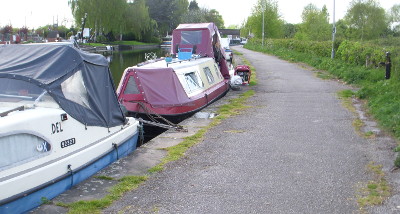IT WOULD seem that whoever creates Canal & River Trust stoppage notices has taken my advice—but taken it too far.
For instead of the previous somewhat obscure and often misleading information in its stoppage notices that I complained of, they have gone the whole hog and now tell us nothing!
The last two such notices include one concerning the Aire & Calder and the other—yet again—the Leeds & Liverpool, both however with glaring omissions.
The Aire & Calder notice tells us: 'Notice Alert: Location Woodesford Lock. Aire & Calder Main Line, Navigation Closed'. Reason: Repair. Thursday 6 February 2020 14:45 until further notice'.
And the Leeds & Liverpool notice tells us: 'Leeds & Liverpool Canal.Navigation Closure. Location: Brewery Bridge. Thursday 6 February 2020 15:15 until further notice. Reason: Repair.
No information whatsoever of the reason for the stoppage or how long it will be in force.
Is this fair to boaters? For let's not forget, though it is winter CaRT has many continuous cruisers that it demands travel certain distances, so the navigations are of course in use.
The omission of the reason for the stoppage is important to the boater. For if he is told a paddle has failed, the boater will expect a quick repair so can carry on accordingly. However if it is one of those 'leaks', the navigation will be closed for weeks, meaning the boater will have to make other arrangements.
This really is not good enough, and once again shows CaRT's disregard for boaters in an attempt to minimise its constant navigation failures, by listing them as 'repairs'.
A bit like the Chinese, eh?
Action at last
So it seems the heavy hand of the Environmental Agency in coming down hard on its non-payers, costing the nine boaters it sued an average of £1,000 a throw, has given CaRT a nudge for it now tells it is going to take action against 'inappropriate mooring', with the risk of licences being suspended.
I have certainly nothing against something being done about 'inappropriate mooring' that I and many others have been complaining about for years—nearly 20 in my case, so it really is about time CaRT woke up to the fact that such is a menace to rule abiding boaters.

And yes, the two (pictured) that spent most of a summer opposite the water tap on Sawley Cut and on a 48 hours mooring at that, without anything being done.
I know it was a long time ago but who remembers the selfish fella who moored for month after month on the 48 hours moorings at Willington, preventing the use of the best bollard moorings by the pub being used by anyone else?
So it is long overdue that some action was taken against such total disregard for the rules, let's hope it comes to pass.
It's own 'inappropriate moorings'
Amongst the many places listed where it is inappropriate to moor are the 'outside of bends'.
Which rather creates a problem. For I know of many official moorings that are definitely on the outside of bends. (That obviously whoever conjured up these new rules was not aware of.)
So does that mean should you moor there you are going to get a warning? Or will CaRT now get rid of all its mooring on the outside of bends.
And of course dear CART has forgotten the worst offenders—hire boaters. They are really going to be bothered about losing their boat licences aren't they.
Silly sods. Seems like a bit of 'pie in the sky' to me.
All shook up
I reckon it must have been a bit of a shock for those nine Environmental Agency boat owners without registrations that were taken to court and walloped for just under a total of £9,000.
Little wonder there was such a rush to get CaRT to take over its waters...
Electric and hydrogen
So the Inland Waterways Association want boats to be powered by either electricity or hydrogen eh?
If the cost of such in vehicles is anything to go by the cost for the average boater to change from diesel will mean the end for many. It certainly would for us.
And knowing of the exaggeration by the manufacturers of the range of such vehicles, just how many charging points will there have to be along the waterways, and who pays? And particularly those charging points that need power bringing in over many miles? Or perhaps they will not bother.
I wonder if the bods dreaming this up have thought about the many other things needing electricy in boats—even when moored?
It all sounds very 'green', but it will be a mess.
Victor Swift
